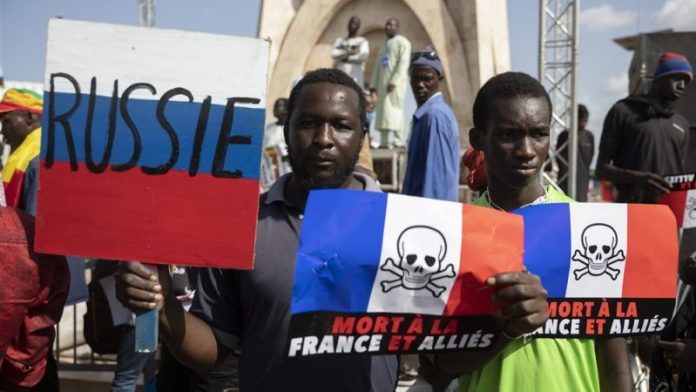The video was an example of a growing Russian influence campaign that amplifies criticisms of France and presents Moscow as an ally in Central and West Africa, two diplomats at France’s foreign ministry said.
After armed men killed nine Chinese nationals at a gold mine in the Central African Republic in March, a video circulated on the internet saying France had secretly ordered the attack and planned to discredit the Russian mercenary group Wagner in the country.
In the video, a Central African Republic rebel fighter says “The French want to drive Wagner out of Africa”.
The clip rang alarm bells in Paris at a media monitoring unit within the foreign ministry created last year as part of a broad diplomatic strategy to revive ties in France’s former African colonies after years of waning influence.
The foreign ministry said the unit quickly traced the video to a cluster of Facebook and Twitter accounts with links to Russian disinformation, including from Wagner – an outfit close to the Kremlin that has troops in Ukraine and has fought on the side of several governments in Africa.
The video was an example of a growing Russian influence campaign that amplifies criticisms of France and presents Moscow as an ally in Central and West Africa, two diplomats at France’s foreign ministry said.
The ministry denied any French role in the mine attack.
Wagner, the Kremlin, and the government of the Central African Republic did not respond to requests for comment for this story.
The perpetrators of the attack have not been caught and Reuters was not able to determine who was behind it.
Russian propaganda has found fertile ground in Africa among grievances over France’s decades-old track record of military intervention and heavy-handed diplomacy, officials said.
The foreign ministry said the unit quickly traced the video to a cluster of Facebook and Twitter accounts with links to Russian disinformation, including from Wagner – an outfit close to the Kremlin that has troops in Ukraine and has fought on the side of several governments in Africa.
The video was an example of a growing Russian influence campaign that amplifies criticisms of France and presents Moscow as an ally in Central and West Africa, two diplomats at France’s foreign ministry said.
The ministry denied any French role in the mine attack.
Wagner, the Kremlin, and the government of the Central African Republic did not respond to requests for comment for this story.
Read more : EU strongly condemned the desecration of the Holy Quran: ‘a clear act of provocation’
The perpetrators of the attack have not been caught and Reuters was not able to determine who was behind it.
Russian propaganda has found fertile ground in Africa among grievances over France’s decades-old track record of military intervention and heavy-handed diplomacy, officials said.
French Foreign Minister Catherine Colonna told parliament this month that anti-French sentiment in Africa could partly be blamed on “hostile actors, coming notably from Russia”.
Russia and Wagner have a track record of media manipulation and disinformation, which Wagner founder Yevgeny Prigozhin has admitted to.
The European Union sanctioned Wagner in February for alleged rights abuses and spreading disinformation, including in Africa.
However, not all anti-French feelings in Africa can be blamed on Moscow. French military campaigns have caused civilian deaths, and many critical social media accounts reflect genuine concerns over France’s outsized role in African affairs.
Some criticisms “are true”, French President Emmanuel Macron told Reuters in Kinshasa at the end of a four-day central African tour in March, referring to the allegation France had continued to carry colonial attitudes even after independence in West Africa.
“We are no longer there to be the substitute for a coup d’etat or a failing political process,” Macron said.
In May, Russia’s foreign ministry spokesperson Maria Zakharova said France had been interfering in African nations’ internal affairs for decades, toppling leaders it objected to and building “a neo-colonial system of influence”.
In contrast, she said, Russia did not interfere in other countries’ affairs.
The new media monitoring unit differs from a previous French effort, revealed by Facebook owner Meta in 2020, that fought back online against Wagner-linked networks with fake accounts of its own.
The foreign ministry unit doesn’t promote or generate fake news, the two diplomats said.
The media monitoring unit emerged last July, the same month that France withdrew thousands of troops from Mali, a former colony in West Africa.
A similar pull-out followed in neighboring Burkina Faso at the start of this year – steps prompted in part by military coups and the presence of Wagner mercenaries in the region.
The military pullback was a significant failure for Macron and strengthened Moscow’s presence at a time the West was seeking to contain Russia over the invasion of Ukraine.
It also dealt a setback to Western efforts to counter Islamist insurgents in the Sahel region.
After the withdrawals, the onslaught of anti-French content on social media and messenger apps continued: amplifying pro-Russian videos, animation, and memes, and often spreading distorted or untrue stories, according to the two diplomats and four others.
This trend coincided with the expulsion of French news networks by the new military governments in Mali and Burkina Faso and local media tie-ups with Russia Today and other Russian state media ejected from Europe in the wake of the invasion of Ukraine.
The war has reopened diplomatic fault lines between the West and Russia present in Africa since the Cold War.













